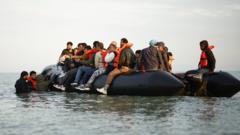Will This Week's New Strategy Unveil the First People-Smuggling Sanctions?

Understanding the Government's New Sanctions Against People-Smuggling
The UK government is set to unveil a groundbreaking sanctions initiative targeting people-smuggling networks, as part of a broader strategy to curb illegal immigration. This unprecedented measure aims to hold accountable not only the gang leaders and corrupt officials involved in these operations but also the companies that provide the necessary equipment for small boats used in these crossings. With an alarming rise in the number of individuals attempting to enter the UK via the English Channel, this initiative is positioned as a crucial step in addressing the underlying issues of human trafficking and irregular migration.
The Context of the Sanctions Initiative
In recent years, the UK has seen a dramatic increase in illegal crossings, with Home Office data indicating that over 20,000 people made the perilous journey in small boats in just the first half of this year alone. This represents a staggering 50% increase compared to the previous year. Such statistics highlight the urgency of the situation and the need for effective measures to deter these dangerous crossings.
Foreign Secretary David Lammy has been vocal in addressing the dangers posed by criminal gangs that exploit vulnerable individuals seeking a better life. He expressed that these gangs have been operating with impunity, profiting from the desperation of those they deceive. The upcoming sanctions are intended to disrupt this cycle by freezing the assets of those involved and preventing them from engaging with the UK’s financial systems.
Key Targets of the Sanctions
The sanctions will focus on a variety of individuals and entities, including:
- Gang leaders orchestrating the smuggling operations
- Corrupt officials facilitating these illegal activities
- Companies supplying small boat equipment
- Individuals providing fake documents necessary for illegal crossings
- Middlemen utilizing Hawala networks for financial transactions
By targeting these specific groups, the government aims to dismantle the operational framework of the smuggling networks and cut off their funding, thereby disrupting their activities significantly.
Political Pressure and Public Sentiment
The announcement of these sanctions comes amid increasing political pressure on Prime Minister Sir Keir Starmer to take decisive action against illegal immigration. Critics, including shadow home secretary Chris Philp, argue that merely freezing bank accounts will not suffice to stop the flow of migrants across the Channel. Philp has pointed out that a more comprehensive approach is necessary to effectively manage the situation.
Moreover, public sentiment around immigration has grown increasingly polarized. Protests have erupted in various locations, with some expressing genuine concerns about the impact of asylum seekers on their communities. The government's response to these protests underscores the complexity of the immigration debate and the need for a balanced solution that addresses both humanitarian needs and public safety.
The Broader Implications of Sanctioning People-Smuggling Operations
Implementing sanctions against people-smuggling operations is a significant step, but it is essential to consider the broader implications of such actions. The effectiveness of the sanctions will depend on various factors, including international cooperation, the ability to enforce these measures, and addressing the root causes of migration.
International Cooperation in Combatting Human Trafficking
Addressing the issue of people-smuggling requires a collaborative effort not only within the UK but also with other nations. Many of the criminal networks involved operate transnationally, making it imperative for countries to work together to share intelligence, strengthen border controls, and enhance law enforcement capabilities.
For example, agreements with neighboring countries, such as France, can facilitate the return of migrants and help manage the flow of individuals attempting to cross the Channel. The recent "one in, one out" deal signed by Prime Minister Starmer is a step towards fostering international cooperation in managing asylum seekers and illegal immigration.
Addressing Root Causes of Migration
While sanctions may disrupt the operations of people-smuggling gangs, it is crucial to also address the root causes that drive individuals to migrate in the first place. Many people fleeing their home countries do so due to violence, persecution, or extreme poverty. Therefore, a comprehensive strategy should include humanitarian assistance, development aid, and diplomatic efforts to stabilize regions experiencing conflict and unrest.
The Role of Law Enforcement in Enforcing Sanctions
To ensure the success of the sanctions initiative, law enforcement agencies must be equipped with the necessary tools and resources to enforce these measures effectively. This includes conducting thorough investigations, gathering evidence, and collaborating with international law enforcement partners to apprehend individuals involved in smuggling operations.
Challenges in Enforcement
Enforcing sanctions can be challenging, particularly when dealing with criminal organizations that often operate in secrecy and employ sophisticated methods to evade detection. Law enforcement agencies must remain vigilant and adaptable to counter the evolving tactics of these gangs.
Moreover, there is a need for ongoing training and support for law enforcement personnel to ensure they can effectively address human trafficking and smuggling cases. This includes understanding the complexities of migration issues and the rights of asylum seekers.
Community Engagement and Public Awareness
Raising public awareness about the dangers of human trafficking and the realities of smuggling networks is another critical component of the government's strategy. Engaging with communities to provide information about the risks associated with irregular migration can help deter individuals from falling victim to smuggling operations.
Furthermore, fostering community support for legitimate asylum seekers can contribute to a more harmonious integration process, allowing individuals to rebuild their lives while alleviating public concerns regarding immigration.
Future Perspectives on Immigration Policy
The introduction of these sanctions marks a pivotal moment in the UK's approach to immigration policy. As the government seeks to balance the need for security with humanitarian considerations, the effectiveness of these measures will be closely monitored by both supporters and critics alike.
Potential for Policy Changes
Given the evolving nature of immigration issues, it is likely that the UK government will continue to reassess and adapt its policies. This may involve further sanctions, legislative changes, or new agreements with other countries to manage migration more effectively.
Ultimately, the goal should be to create a fair and just immigration system that prioritizes the safety and dignity of individuals while addressing legitimate security concerns. Balancing these priorities will require ongoing dialogue and collaboration among all stakeholders involved.
Conclusion: A Step Towards a Safer Future?
The upcoming sanctions against people-smuggling networks represent a significant step in the UK government's efforts to combat illegal immigration. By targeting the financial networks that enable these operations, the government aims to disrupt the status quo and hold accountable those profiting from human misery. However, the success of this initiative will depend on various factors, including international cooperation, effective law enforcement, and a commitment to addressing the root causes of migration.
As these strategies evolve, one must consider how they will shape the future of immigration policy in the UK. Will these sanctions lead to a safer environment for both migrants and citizens, or will they merely scratch the surface of a much deeper issue? The answer lies in the ongoing commitment to address the complexities of migration with compassion and pragmatism.
FAQs
What are the new sanctions against people-smuggling?
The new sanctions involve targeting gang leaders, corrupt officials, and companies involved in supplying equipment for small boats used in illegal crossings. These measures include asset freezes and travel bans.
Why are these sanctions necessary?
These sanctions are deemed necessary to disrupt the operations of criminal gangs that exploit vulnerable individuals seeking to migrate, addressing a significant rise in illegal crossings to the UK.
How will the government enforce these sanctions?
Law enforcement agencies will be tasked with investigating and enforcing the sanctions, working collaboratively with international partners to apprehend those involved in smuggling operations.
What role does public awareness play in combatting human trafficking?
Public awareness is crucial for educating communities about the risks associated with irregular migration and fostering support for legitimate asylum seekers, helping to deter individuals from falling victim to smuggling networks.
In conclusion, as the UK navigates this complex issue, the effectiveness of its approach will be closely scrutinized. Will these sanctions lead to meaningful change, or are they merely a temporary fix in a much larger problem? #PeopleSmuggling #ImmigrationPolicy #SanctionsInitiative
Published: 2025-07-22 04:28:03 | Category: technology



